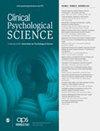What Is the Role of Affective Cognition in Trauma and Posttraumatic-Stress-Disorder-Related Drinking? A Systematic Review
IF 4.1
2区 医学
Q1 PSYCHIATRY
引用次数: 0
Abstract
Trauma and posttraumatic stress disorder (TR/PTSD) are implicated in deleterious alcohol outcomes, yet the processes that undergird these associations remain elusive. Affective (i.e., emotionally laden) cognitions may play key roles in TR/PTSD-related drinking that could inform prevention and intervention. In the present review, we synthesized extant literature ( k = 58) on affective cognitions and their role in negative- and positive-reinforcement TR/PTSD-related drinking, including alcohol-specific (e.g., drinking motives, alcohol expectancies) and non-alcohol-specific (e.g., emotion-regulation cognitions, perception and attentional biases) cognitions. Findings generally supported the importance of alcohol-specific cognitions in negative-reinforcement drinking more so than positive-reinforcement drinking. Non-alcohol-specific affective cognitions were considerably less researched. Several gaps in the knowledge base emerged; studies were overwhelmingly cross-sectional, conducted mainly within homogeneous college samples, and often did not disaggregate effects of trauma exposure from those of PTSD. Future research is needed to address these gaps to optimally inform clinical efforts to reduce TR/PTSD-related drinking risk.情感认知在创伤和创伤后应激障碍相关饮酒中的作用是什么?系统回顾
创伤和创伤后应激障碍(TR/PTSD)与有害的饮酒结果有关,但支撑这些关联的过程仍然难以捉摸。情感认知(即带有情绪色彩的认知)可能在与创伤后应激障碍相关的饮酒中发挥关键作用,从而为预防和干预提供依据。在本综述中,我们综合了关于情感认知及其在负强化和正强化TR/PTSD相关饮酒中作用的现有文献(k = 58),包括酒精特异性认知(如饮酒动机、酒精预期)和非酒精特异性认知(如情绪调节认知、感知和注意偏差)。研究结果普遍支持酒精特异性认知在负强化饮酒中的重要性高于正强化饮酒。对非酒精特异性情感认知的研究要少得多。知识库中出现了一些空白;绝大多数研究都是横断面研究,主要在同质的大学样本中进行,而且往往没有将创伤暴露的影响与创伤后应激障碍的影响分开。未来的研究需要填补这些空白,以便为临床工作提供最佳信息,降低与创伤后应激障碍相关的饮酒风险。
本文章由计算机程序翻译,如有差异,请以英文原文为准。
求助全文
约1分钟内获得全文
求助全文
来源期刊

Clinical Psychological Science
Psychology-Clinical Psychology
CiteScore
9.70
自引率
2.10%
发文量
35
期刊介绍:
The Association for Psychological Science’s journal, Clinical Psychological Science, emerges from this confluence to provide readers with the best, most innovative research in clinical psychological science, giving researchers of all stripes a home for their work and a place in which to communicate with a broad audience of both clinical and other scientists.
 求助内容:
求助内容: 应助结果提醒方式:
应助结果提醒方式:


